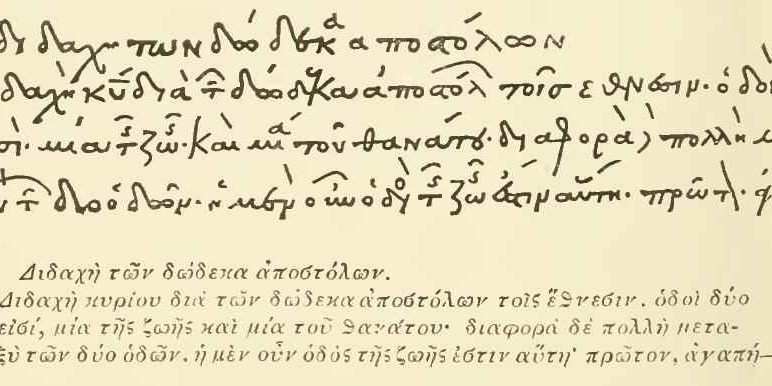
Apostolic Fathers Every Christian Should Know: Seven Excerpts from The Didache
In recent posts, I have been introducing you to key
1. There are two ways, one of life and one of death. There is a great difference between the two ways. Now this is the way of life: first, you shall love the God who made you; second, you shall love your neighbor as yourself. Whatever you do not want done to you, do not do to someone else. (1.1–2)
2. The second commandment of the teaching is: Do not murder. Do not commit adultery. Do not corrupt children. Do not be sexually immoral. Do not steal. Do not practice magic. Do not murder a child by abortion, nor kill it at birth. Do not covet your neighbor’s possessions. (2.1)
3. The way of death is this: first of all it is evil and full of cursing—murders, adulteries, lusts, sexual immoralities, thefts, idolatries, magical practices, sorceries, robberies, false testimonies, hypocrisies, duplicities, deceit, self–importance, meanness, stubbornness, greed, foul language, jealousy, brashness, pride, arrogance. (5.1)
4. Now about baptism: this is how to baptize. After you have explained all these things ahead of time, baptize in running water in the name of the Father and of the Son and of the Holy Spirit. But if you do not have running water, baptize in something else. If you cannot baptize in cold water, then do it in warm. If you have neither, pour water on the head three times in the name of the Father and the Son and the Holy Spirit. (7.1–3)For some of the writings of the Apostolic Fathers, we don’t know anything about the author. The set of church instructions known as The Didache is one such document. Click To Tweet
5. Your fasts should not be like the hypocrites. They fast on Monday and Thursday, but you should fast on Wednesday and Friday. (8.1)
6. Nor should you pray like the hypocrites. Instead pray like the Lord commanded in his gospel: “Our father in heaven…” (8.2)
7. Now about apostles and prophets, act in accord with the rule of the gospel. Every apostle who comes to you should be welcomed as you would welcome the Lord. But he should not stay more than one day, unless there is a need, in which case he can stay one more day. But if he stays three, he is a false prophet. When the apostle leaves he must not take anything except bread to get him to his next night’s stay. If he asks for money, he is a false prophet. (11.3–6)
For more information about the Apostolic Fathers, see Kenneth Berding’s easy-to-read narrative introduction (story form), The Apostolic Fathers: A Narrative Introduction.